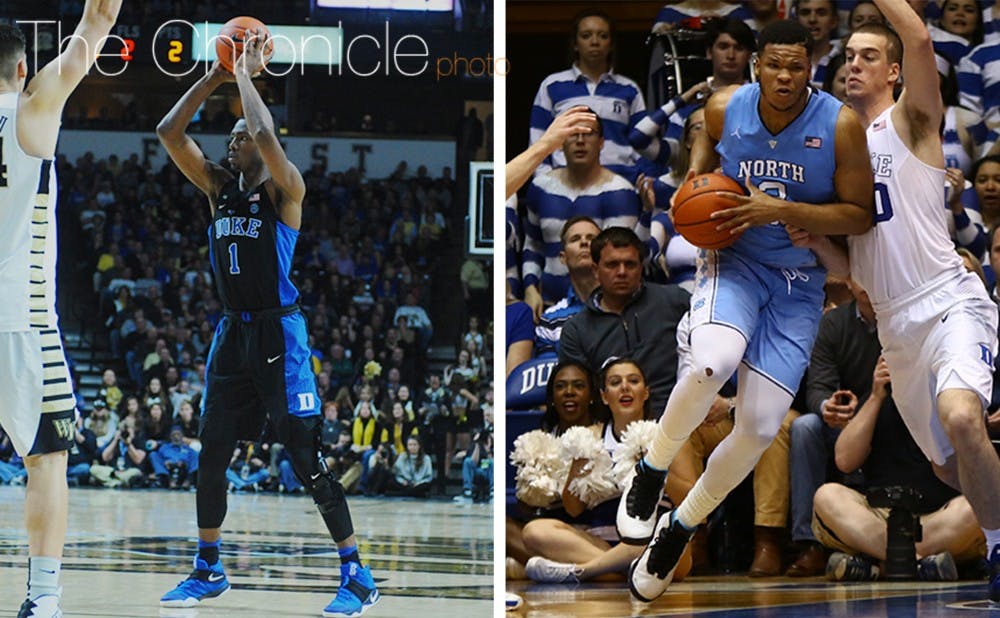Thursday’s renewal of the Tobacco Road rivalry promises to be, as always, a fierce battle between two of college basketball’s elite programs.
It’s Coach K, with his health and that of his roster finally intact, leading the Blue Devils against Roy Williams and the Tar Heels, who are once again looking like the class of the ACC. This time around, it’s Duke in need of a statement win, but North Carolina would love nothing more than to deal its rival a second straight loss at Cameron Indoor Stadium.
But it’s also, in a more subtle way, a clash of philosophies on how to build a winning program in the modern era.
On one hand, you have the Blue Devils, who have turned Durham into a pit stop for NBA-bound talent, capturing one-and-done recruits at a rate exceeded by only Kentucky and John Calipari.
This year’s team features three players—Jayson Tatum, Harry Giles and Marques Bolden—who came to Durham billed as one-and-dones, although Bolden no longer seems like a lock to race to the professional ranks. If he stays one more season, he’ll be joined by incoming freshmen Wendell Carter and Gary Trent, Jr., two highly-touted recruits who are unlikely to stay on campus for their sophomore years.
It’s not like this trend just began this season. Since the 2010 championship season, the structure of Duke’s teams has taken on a starkly different form, relying more on five-star freshmen than seasoned veterans.
In the past six years, Coach K has seen seven of his freshmen leave for the NBA draft, and all except Tyus Jones were top-10 picks. And it’s hard to say that method hasn’t been effective, considering Duke’s 2015 national championship team was driven by Jones and fellow rookies Jahlil Okafor and Justise Winslow.
On the other end of the spectrum is North Carolina, which hasn’t had a freshman declare for the draft in a decade. The NBA is littered with ex-Tar Heels, but for some reason or another the recruits who come to play in Chapel Hill nearly always stay for more than one year before getting their big paycheck.
Last year, North Carolina was probably the most complete team in the nation—winning both the ACC regular season title and tournament crown, before losing in the waning seconds of the national championship game on a buzzer-beater. They lost their two best players and a pair of All-Americans in Brice Johnson and Marcus Paige, creating a sizable gap to be filled on the floor and in the locker room.
With both programs making national championship runs in consecutive seasons, it’s hard not to compare how each fared the next year, when it had to replace the core pieces of those teams. Last season, Duke, albeit dealing with the injury of captain Amile Jefferson, struggled mightily to integrate a host of new parts and bowed out quietly in the Sweet 16.
Yet the Tar Heels haven’t skipped a beat this year and look poised for another deep run in March. North Carolina just keeps humming along, with veterans Joel Berry II, Justin Jackson, Kennedy Meeks and Isaiah Hicks assuming bigger roles after spending a few years learning the ropes as role players.
Despite Williams openly admitting that even with their best efforts, he and his coaching staff haven't been able to land the top one-and-done recruits like Duke, the Tar Heels brought in a prized five-star big man this season in Tony Bradley. He had a lower recruiting ranking than current Blue Devils Chase Jeter and Marques Bolden, but Bradley has contributed meaningful minutes on a team with an already loaded frontcourt—and most Blue Devil fans would love to have him instead of Giles or Bolden right now.
People have been searching for reasons to explain why Duke has underachieved so far this year despite a supposed embarrassment of riches in terms of talent. Even after accounting for early-season injuries, this Blue Devil team just hasn’t looked cohesive for any considerable stretch of play.
The more you look around the ACC, the more it becomes apparent that the Blue Devil model is an outlier. The other perennial contenders simply don’t rely on one-and-dones the way Duke does, instead counting on returning players who have been groomed in the system to fill the role of departed stars.
In addition to North Carolina, Virginia, Louisville and Notre Dame all lost multiple essential players—and each of those teams is back near the top of the ACC standings thanks to upperclassmen stepping up. When we’re dealing with still-maturing 18-to-21-year-olds, talent doesn’t always reign supreme, and there’s something to be said for the improvements that come with time. The Blue Devils are no strangers to this idea—both Grayson Allen and Luke Kennard are excellent proof of it.
So perhaps this year is a lesson that creating a great basketball team, especially at the college level, is more than just assembling a collection of very skilled players, but rather something that requires a greater degree of continuity and culture.
But none of that will matter come tip Thursday night, and if Duke can make a major leap to finish off the season, there will be further evidence that its unique combination of veterans and talented underclassmen is just as effective.
If not, Blue Devil fans will again be left waiting for the next crop of freshmen to come in and fill major voids.
Get The Chronicle straight to your inbox
Signup for our weekly newsletter. Cancel at any time.

